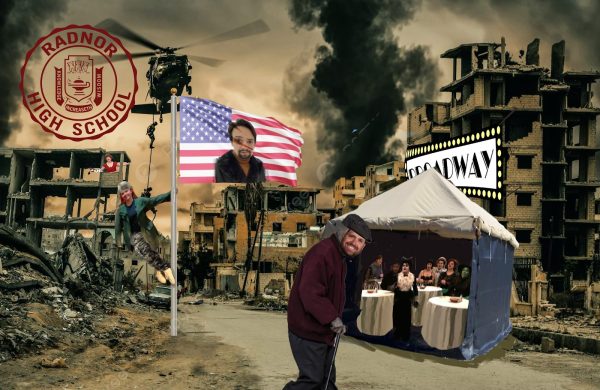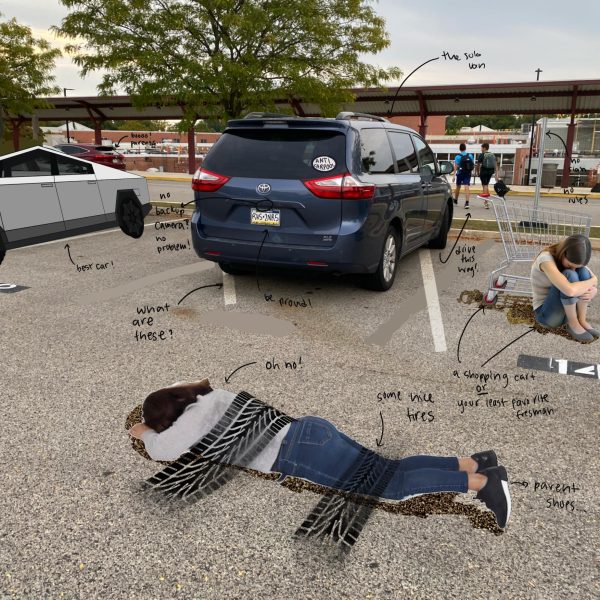Drug Dogs III: The Legal Perspective
April 26, 2017
Radnor High School’s administration has decided on a new school wide policy involving the use of drug dogs to detect the presence of illicit substances on school grounds. In the first installment of the Radnorite’s series on this issue, John Hydrisko and Victoria Vale provided an overview of the situation. To get a solid grasp on the implementation of the new policy, their article is the place to visit. Briefly, a third party company, Interquest Detection Canines, will be tasked with the searches, at the discretion of Radnor’s administration. Cars, hallways, and bags will be sniffed by the dogs on a mass scale. Now, this development raises a plethora of questions. Does the school have the right to conduct mass sweeps of student effects? Are the rights of students violated, even if they forfeit some of their assumed privacies when on campus?
When considering the legality of this policy, it is first important to remember a school’s obligation to protect its students. And this obligation grants the administration more leeway to invade student privacy than the police would have in other locations. The 1985 Supreme Court case New Jersey v. T.L.O. is the most frequently cited authority on this matter. In T.L.O, a student sued her school, claiming the search of her belongings was unconstitutional. The court ruled against her, and ordained that schools can conduct a search when it has “reasonable suspicion”, but that it must also respect the “legitimate expectations of privacy” students maintain. Notably, this is a lower bar than the “probable cause” required by the 4th Amendment of the U.S. Constitution for police officers. Radnor’s School Board Policy 226 frequently cites this ruling in its numerous mentions of “reasonable suspicion.” It also grants the school the power to conduct this search when it states, “Searches conducted by the administration may include but not be limited to utilization of certified drug dogs.” With T.L.O and 226 alone, it appears that these searches are legal. Nevertheless we are governed by more than one decision or one school board policy. Our Commonwealth has its own guidelines on the matter specifically, contained in Article 8 Section 1 of the Constitution of Pennsylvania. It is through this lense that it becomes evident that the proposed random use of drug dogs is legally questionable, morally suspect, and sends the student body the wrong message.
The Supreme Court of Pennsylvania’s decisions in Commonwealth v. Cass (1998) and In the Interest of F.B. (1999) are the relevant judgments by the courts on the legality of searches at schools in PA under the PA constitution. When a public school wants to engage in suspicionless, general, or random searches like the ones currently proposed, the Cass Court wrote that “the inquiry focuses on whether the search itself is reasonable considering the governmental interest in conducting the search when balanced against the level of intrusion occasioned by the search.” And the F.B. Court identified four factors to consider:
1) a consideration of the student’s’ privacy interest, 2) the nature of the intrusion created by the search, 3) notice, and 4) the overall purpose to be achieved by the search and the immediate reasons prompting the decision to conduct the actual search.
How do these factors compare with the proposed dog searches of student lockers and backpacks? Understanding the first two factors together, Radnor owns the lockers, thus the students’ reasonable expectation of privacy within those lockers is minimal. This is also the case with student vehicles on school property. Further, parking at school is a privilege, so the school is within its rights to sniff cars.
Let’s turn now to the backpacks. In the context of a weapons check at the entrance to a school, the F.B. Court noted that “it would be illogical to find a greater privacy interest at stake in searching those personal items outside a locker.” This means that searches of backpacks with reasonable suspicion is legal because it is “illogical” to treat items differently just because they are not in a locker. But does that make sense? Once outside of the locker, students’ backpacks take on a very different, highly personal and private character; thus, searching them is far more invasive. The court however disagrees with this assertion and accordingly searches of individual backpacks are legal. The search of students themselves though violates factors one and two. Students have the highest expectation of privacy on their persons and a search of someone’s person is very invasive. But it appears that students themselves will not be subject to search, which is good news for student privacy and bad news for the efficacy of these misguided searches.
F.B.’s third factor is satisfied by the letter addressed to students on the new policy and the upcoming assembly on the matter. The final factor, however, is especially problematic. Mr. Bechtold stated that these general searches are part of “an effort to keep you safe, and to keep our school free of drugs and alcohol…I have heard from a number you, your parents, and past graduates about these challenges.” This conflicts with facts in cases like Cass, which established significant current possession and use of illegal drugs at the school to be searched. By the statements made by administration, and not searching the school before spring break, it concedes that the concern is not immediate. If there was an urgent danger to students’ health and safety, the school would have conducted its searches already and not be waiting until sometime in May. Deterring drug use is important, but why now? Why throw the net of suspicion over every student instead of taking action based on observations and individualized suspicion?
As former U.S. Supreme Court Justice Sandra Day O’Connor once wrote, the Fourth Amendment has a “strong preference for an individualized suspicion requirement, with its accompanying antipathy toward personally intrusive, blanket searches of mostly innocent people.” In Radnor’s case, mass searches (as the school plans to conduct) mean innocent students blindly forfeiting their sense of privacy under the veil of Radnor’s intent to be drug-free. Surely, if the Radnor administration has solid reason to search a particular individual or group, it can do so under the law. Yet, unless every student is directly suspected of possession of drugs, the notion of a mass search goes against the principles of American constitutional liberty.
Connecting directly, principles of privacy and security take on special importance in the school setting. Former U.S. Supreme Court Justice John Paul Stevens, dissenting in a key 1995 case, stated correctly: “Schools are places where we inculcate the values essential to the meaningful exercise of rights and responsibilities by a self-governing citizenry. If the Nation’s students can be convicted through the use of arbitrary methods destructive of personal liberty, they cannot help but feel that they have been dealt with unfairly.” This is the exact reality students will face. Although the extremely overwhelming majority will be innocent, they will have surrendered their reasonable expectation of privacy. They will have been forced to submit to an arbitrary search that had never been deemed necessary by probable cause or reasonable suspicion.
In that 1995 opinion, Justice Stevens quoted his colleague Justice Brennan, who summed up the problem this way: “Schools cannot expect their students to learn the lessons of good citizenship when the school authorities themselves disregard the fundamental principles underpinning our constitutional freedoms.” So perhaps that is the real question. What will Radnor High end up teaching its students about drug use and about their relationship with institutions of government like public schools?
To the Radnor administration, we understand the importance of eliminating drugs from Radnor High School. However, please reconsider your decision to conduct searches without individualized suspicion or immediate concern. Don’t release the hounds.








Ryan C. Bernicker • Apr 27, 2017 at 12:59 am
Actually, Release the hounds. I think the right to privacy is overrated. If there isn’t anything to hide, than it shouldn’t matter. Although one may think this to be a slippery slope, the school is acting within its rights to keep the school drug free, and I applaud them for it.